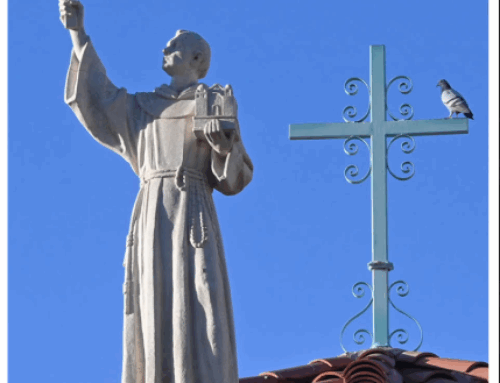(This article originally appeared in the Winter 2021 Issue of TAU-USA #102)
The Widow’s Mite: Lesson on Living
By Francine Gikow, OFS
The story of the widow’s mite in Luke’s gospel, (Luke 21:1-5) always captured my imagination and wonder. How could a person who had nothing be so generous? How could she ignore how she would obtain her next meal? What would she live on?
The story of the poor widow giving all her money to the temple is extremely short and without a lot of detail, so use your imagination to relive the story. We are first informed that the rich put their gifts into the treasury followed by a poor widow who donated her “two very small copper coins.” Although the widow donated only a meager sum of money, nevertheless Jesus directs our attention from the abundant contributions of the rich to the poor widow because “…she out of her poverty put in all she had to live on” (NSRV.C). Jesus’ important lesson in this story, however, is the choice the widow made in making her donation.
The widow must have been well known in the temple and the Jewish community. They must have known her circumstances, her background, her family, and her deceased spouse. The temple must have been her spiritual home and where she met God. The story does not go into detail about who was in the temple with her, but we know there were rich people who donated money to the temple before the widow. Perhaps a few others might have noticed the woman who gave her few precious coins to the temple treasury, but she was immortalized when Jesus noticed, commented, and held her worthy of emulation. She might have been old and poor, but Jesus singled her out. Why?
Jesus understood the depth of her offering. She chose to give everything she had to God. She gave of her sustenance, her future, and her life. She gave of herself, fully and without reserving anything for herself. Do we do the same or do we grasp and keep something for ourselves?
As a widow she had no means of support in her old age. She depended on others in her extended family and the community for livelihood, but she depended on God the most. The poor widow must have realized that all she had was given to her by God and that she was dependent on Him alone. By giving her coins to the treasury, she was just returning what had already been given to her- and for this she was grateful. She was so detached from her “ownership” of money and “things” that she had the freedom to return to God what was God’s in gratitude.
Freedom, you say? How can you be free when poverty forces you to do things you do not want to do? How can you be free if you are limited to working for food, shelter, and the bare necessities? Answer: it is a paradox and a different definition of freedom. Rather, it is the freedom to love God without being concerned with attachments or “things.” Asceticism (self-denial) is difficult. Her life was not easy, but her focus remained purely on God, without the hindrance or distraction of material things.
The widow must also have had great trust: trust in her God who provided all things to her, who accompanied her with his Presence, and consoled her. In comparison to many whose lives are filled with riches but remain unfulfilled, she was rich! Her fulfillment was in God!
The widow’s mite story gives Secular Franciscans many important lessons for our lives: asceticism, poverty, and detachment; trust and dependence on God; and most importantly, single-mindedness in loving God. Freedom and perfect joy are the “fruits” of a life united in Love Incarnate!
“Hold back nothing of yourself for yourselves,
that He Who gives Himself totally to you may receive you totally!”
(LtOrd, 29)


Leave A Comment